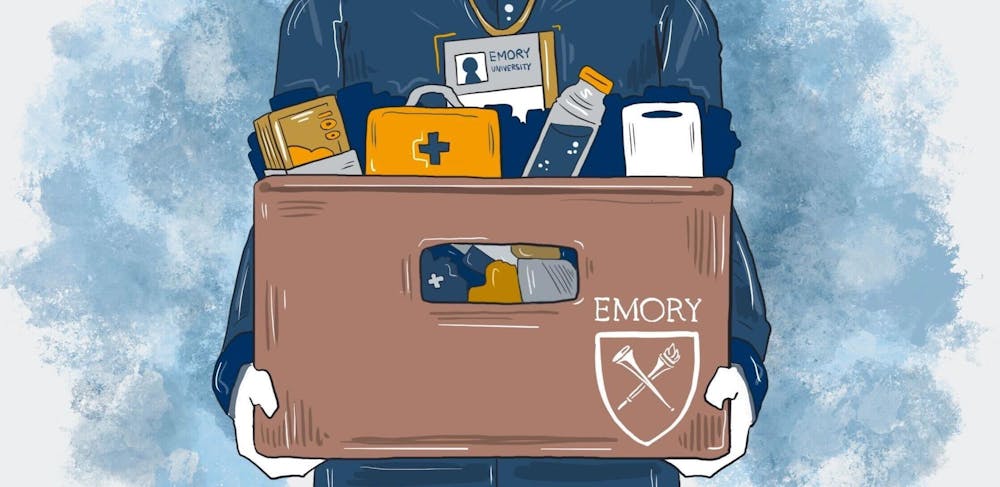As Hurricane Milton prepares to make landfall a week after Hurricane Helene devastated the southeastern United States, the Emory University community is reminded of our closeness to the tragedy. The storm became the second-deadliest hurricane to hit the United States in the past 50 years, killing a total of 227 people across six states. In Georgia alone, 33 people died, the youngest of whom were newborn twins, killed by debris alongside their mother, Kobe Williams.
In addition to North and South Carolina, the disaster has blighted entire communities in Georgia as inadequate infrastructure collapsed under catastrophic winds and torrential downpour, resulting in Atlanta’s first ever flash-flood emergency. As missing person reports continue to rise and communities grapple with the loss of clean water and electricity for days, the aftermath of Helene compels us to look beyond Emory’s campus and focus on the individuals at the epicenter of its devastation.
As the second largest private employer and institution in Atlanta with an economic impact of nearly $14 billion, Emory is clearly intertwined with Atlanta, and should therefore be involved in helping its community during difficult times. The University even filed for its own annexation into Atlanta in 2017, demonstrating its drive to be seen as an Atlanta institution through and through. Therefore, in Helene’s denouement, Emory has a responsibility to increase its support for Atlanta. The University must mobilize its expertise in environmental science, its research capabilities, and its partnerships with local agencies to lead the city and Georgia in recovery from Helene and beyond.
In a statement to The Emory Wheel, Office of Critical Event Preparedness and Response Senior Director Sam Shartar said that the office “initiated planning and mitigation strategies to lessen impacts of flash/urban flooding and downed trees with other departments across Emory's campuses in preparation for a potential tropical weather event.” Additionally, Emory offers a laudable internal University Hardship Fund to assist faculty and staff impacted by life-changing events like natural disasters. The fund helps staff with essentials like housing and food during times of crisis.
However, Emory's participation in broader recovery initiatives is primarily internal, which starkly contrasts the proactive approaches taken by other institutions like the University of Georgia (UGA), which has effectively mobilized assistance for vulnerable populations beyond the UGA community through food and water delivery, infrastructure repair and donation collection for northern Georgia.
With its abundant resources, Emory must similarly become a leader in higher-education relief efforts for its surrounding communities in Georgia by investing in preventative and palliative measures. Emory can actively do more for disaster relief by sending medical and emergency response staff to areas in Georgia where resources are limited. Additionally, with an Environmental Science department composed of leading researchers in the field of natural disaster response and relief, Emory has the opportunity and responsibility to solidify itself in the implementation of methods to combat them. These research efforts are underscored by the urgency of climate change, as climate experts believe storms like Helene may become commonplace beyond Hurricane Alley.
In the face of crisis, Emory must also increase support for current student efforts to provide free or reduced-cost healthcare to environmental justice communities in Atlanta and beyond such as Emory Remote Area Medical and the Emory Farmworker Project, as well as more grassroots student fundraising initiatives such as Emory student-athlete Andrew Burchett’s (27C) fundraising efforts for Asheville, N.C. The University can also follow in other institutions’ footsteps. For instance, Duke University (N.C.) has partnered with local organizations to provide basic necessities to affected communities in North Carolina and has supported student-led service trips to directly aid communities. Emory’s contributions can and should reflect its position as an integral part of the city's fabric, not just as a self-contained institution.
Georgia is the seventh most hurricane-prone state, and many communities throughout the state lack the resources to withstand and rebuild from natural disasters. With imminent climate threats, it is imperative that we, the Emory community, de-center ourselves in climate conversations and emphasize the gravity of the crisis in vulnerable communities. Despite Emory’s campus and properties remaining largely unscathed by Helene, we must look outside our bubble and not dismiss the profound realities faced by countless individuals and communities throughout the state.
By overlooking the harsh realities communities face amid natural disasters, we risk fostering an environment devoid of empathy and solidarity. Initiatives like the Georgia Climate Project humanize that disproportionate impact with the personal stories of Georgians whose lives climate change has fractured and their resilience in the face of an uncertain future. With the entire world facing a bleak climate outcome, we must remember that we are not at the center of it — rather, all people and communities are.
As climate change intensifies storms, Emory must use its financial resources and research expertise to distinguish itself as a leader in local disaster response and long-term recovery efforts. As we discuss climate change, we must resist navel gazing and amplify the stories of those at greatest risk in the global climate crisis within our own city. Atlanta is Emory’s home to care for, and by investing in disaster relief and long-term climate resilience, our institution can integrate itself further into Atlanta and Georgia, healing the scars left by Helene.
The above editorial represents the majority opinion of The Emory Wheel’s Editorial Board. The Editorial Board is composed of Editor Marc Goedemans, Carly Aikens, Hunter Buchheit, Allie Guo, Ethan Jacobs, Carson Kindred, Justin Leach, Eliana Liporace, Niki Rajani, Josh Rosenblut, Ilka Tona and Crystal Zhang.








